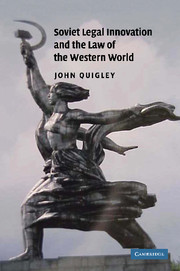Book contents
- Frontmatter
- Contents
- Abbreviations
- Preface
- Acknowledgments
- PART ONE THE SOVIET CHALLENGE
- PART TWO THE WEST ACCOMMODATES
- PART THREE THE BOURGEOIS INTERNATIONAL ORDER
- 16 Equality of Nations
- 17 The End of Colonies
- 18 The Criminality of War
- 19 Protecting Sovereignty
- 20 Military Intervention
- PART FOUR LAW BEYOND THE COLD WAR
- Notes
- Bibliography
- Index
16 - Equality of Nations
Published online by Cambridge University Press: 27 July 2009
- Frontmatter
- Contents
- Abbreviations
- Preface
- Acknowledgments
- PART ONE THE SOVIET CHALLENGE
- PART TWO THE WEST ACCOMMODATES
- PART THREE THE BOURGEOIS INTERNATIONAL ORDER
- 16 Equality of Nations
- 17 The End of Colonies
- 18 The Criminality of War
- 19 Protecting Sovereignty
- 20 Military Intervention
- PART FOUR LAW BEYOND THE COLD WAR
- Notes
- Bibliography
- Index
Summary
The soviet government's call to dependent peoples could not have come at a worse time for the European powers. World War I was about to come to an end, and the Allies, led by Britain and France, were occupying the vast Ottoman Empire in the Middle East, plus the colonial holdings of Germany in Africa. By secret agreement, Britain and France had divided up some of this territory between them. The Soviets denounced the secret agreements and criticized Britain and France for colonizing other peoples of the world. In a number of nominally independent Middle Eastern and Asian countries, the Western powers enjoyed so-called extraterritorial rights. This practice was under severe criticism in those countries, and the Soviets joined the chorus of denunciation. The Soviet stance on these matters became a factor in shaping the post-war world order.
Public Registration of Treaties
As we saw in Chapter 6, the Soviet government criticized the secret treaties by which the European powers parceled out the territory of the “less civilized” peoples. The Soviet publication of the World War I era secret treaties created a firestorm. Public opinion was “deeply shocked” by the revelation of secret dealings at odds with postures the states were taking in public. Nongovernmental groups lobbied the British government, demanding “an end to secret diplomacy and control of foreign policy by Parliament.”
The public reaction to the Soviet revelations had a “profound effect” on U.S. President Woodrow Wilson.
- Type
- Chapter
- Information
- Soviet Legal Innovation and the Law of the Western World , pp. 133 - 142Publisher: Cambridge University PressPrint publication year: 2007



